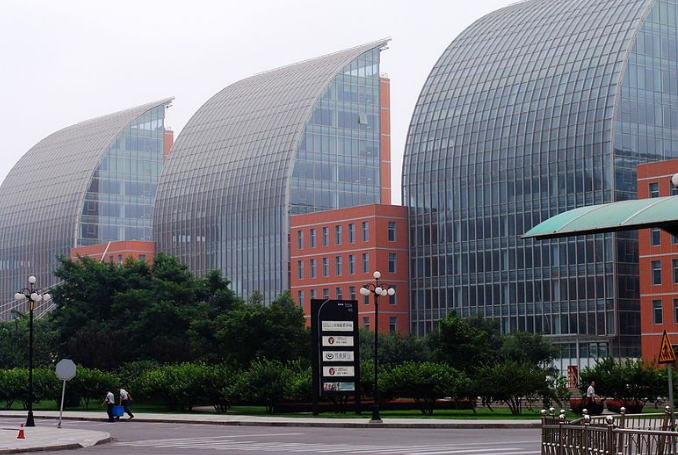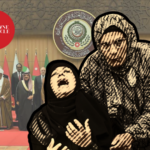The West’s China Complex: Beijing as the Enemy and the Savior

Modern buildings in Tianjin Economic-Technological Development Area (TEDA), Tianjin, China. (Photo: Alexander Needham, via Wikimedia Commons)
By Ramzy Baroud
“Could China’s economy collapse?” was the title of an October 15 article published by QUARTZ magazine. The article makes an ominous case of a Chinese economic crash and its impact on China’s and global economies.
This is one of numerous reports appearing in recent weeks in Western mainstream media, all motivated by recently published economic indicators pointing to less-than-expected growth in various sectors of the Chinese economy, especially in the field of construction.
It is understandable that the volatility of global markets could instigate immediate concern among economists worldwide, especially when the economic output of a country the size of China – the world’s overall fastest-growing and second-largest economy – stalls, however briefly.
What is puzzling is how a fully predictable economic slowdown – considering the adverse effects of the pandemic on global trade – becomes a compelling reason to fuel predictions of a supposedly imminent Chinese collapse.
For QUARTZ, China’s supposed economic woes are an outcome of Beijing’s centralized economy, the Communist party’s political crackdowns and the restructuring of the private sector. If growth continues to slow down, “China may well witness civil unrest,” the article predicts, though without providing concrete evidence to back up such a dramatic assertion.
Compare this doomsday reading of the manufactured ‘crisis’ in China to the real fuel crisis in the UK, where a collective panic led to millions of people rushing to buy petrol and diesel fuels, resulting in massive disruptions, shortages of supplies and traffic jams. Western media downplayed the unprecedented crisis, as if it was merely the outcome of simple bureaucratic mismanagement or a mere miscalculation pertaining to supply and demand. If the equivalence of the UK’s dystopian scenes were witnessed in China, Western journalists would be ready to report on the ‘civil unrest’ and the impending revolution, even.
However, the anti-China media hype, which has been on the rise since the beginning of the Donald Trump Administration’s term in office, is a double-edged sword. While media propaganda, which habitually portrays China as an unstable country and depicts its decades-long economic growth as if a fleeting phenomenon, benefits greatly from downgrading China’s status, Western economies will be the first to pay the price should China enter a long-term economic recession.
Unlike the Soviet Union, which economy had existed in near-total isolation of Western markets, the Chinese economy is closely intertwined with the global economy, from Europe to North America, to Africa and beyond. The saying ‘if China sneezes, the world catches a cold’ has never been truer.
According to a recent Bloomberg illustration, displaying “Contributions to Global Growth” by various leading economic powers, China, especially starting 2010, served the role of the backbone of the global economy. The year 2020 was particularly interesting, as only China sustained a significant growth above the zero-percentage point.
The centrality of China as the main fuel of global economic growth presents the West with an impossible dilemma. On the one hand, the US and its allies want to ensure that China remains a minor global political power while, on the other hand, they continue to rely on the Chinese ‘economic miracle’ to keep their own economies afloat. It should come as no surprise that, according to the European Commission, “China is the EU’s biggest source of imports and its second-biggest export market”.
As US Defense Secretary Lloyd Austin headed to Brussels on October 21 to join his first in-person NATO defense ministers’ conference, the Washington Post reported that Austin was joining the highly-influential meeting “with China on his mind”.
What worries Austin and the US military more than the vast capabilities and constant improvements of its Chinese counterpart, is NATO’s supposed failure to appreciate the ‘China threat’. Indeed, despite the US’ repeated warnings about China’s military ascendency, Europe and most NATO members remain largely nonchalant.
Simply put, Washington wants Europe to shoot itself in the foot. By isolating China, Europe would consequently isolate itself, thus curtailing its own economic growth and, by extension, slowing down the entire global economy. Considering the trust deficit between the EU and the US, resulting from the instability of the Trump Administration’s years, Biden’s failure to completely change course, and the more recent Afghanistan withdrawal debacle, chances are Europeans will not be following in Washington’s footsteps this time around, as they have during the height of the US-Soviet Cold War.
The above assertion has been demonstrated, time and again, in real numbers, the latest of which was a survey by the European Council on Foreign Relations, which polled Europeans in twelve different EU member states. Most Europeans, 59 percent, the survey showed, felt that their countries are not involved in a cold war with China.
Foreign Policy magazine reported on the findings with the following title: “Europeans Want to Stay Out of the New Cold War”. Chances are neither Western media alarmists nor Austin’s interventions at the NATO conference will change this reality.
China’s economy is likely to continue experiencing its ebbs and flow, thanks to the global recession resulting from the pandemic. On their own, such fluctuations will unlikely change the narrative of the determined Chinese rise as a global power, or that of the unmistakable western decline. The sooner we acknowledge this reality, the better.
– Ramzy Baroud is a journalist and the Editor of The Palestine Chronicle. He is the author of five books. His latest is “These Chains Will Be Broken: Palestinian Stories of Struggle and Defiance in Israeli Prisons” (Clarity Press). Dr. Baroud is a Non-resident Senior Research Fellow at the Center for Islam and Global Affairs (CIGA) and also at the Afro-Middle East Center (AMEC). His website is www.ramzybaroud.net










































0 Comments